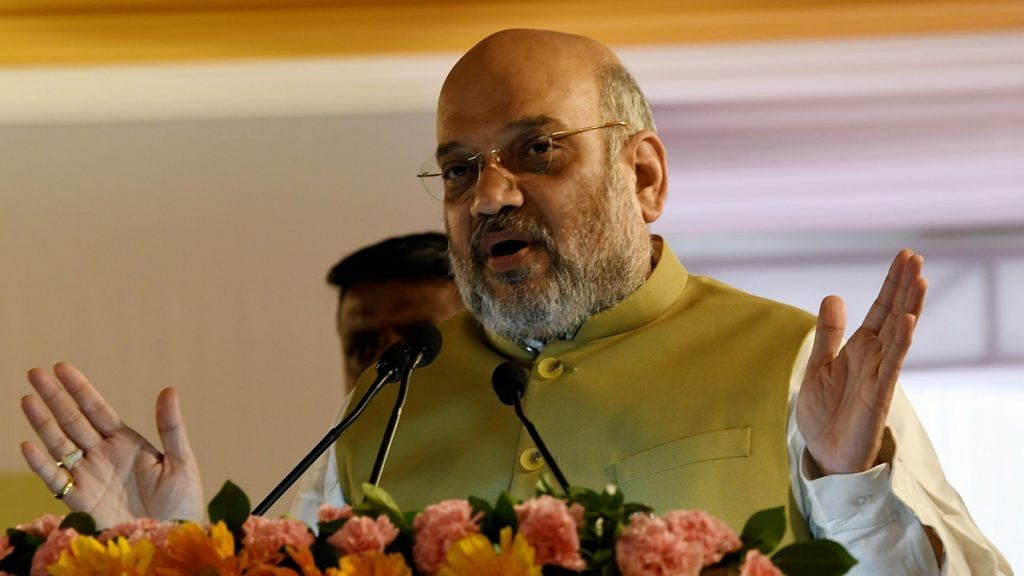New Delhi: Home Minister Amit Shah has come out in strong defence of India’s decision to walk out of the ASEAN-led mega free trade pact, Regional Comprehensive Economic Partnership or RCEP, calling it a “bold decision”.
At the same time, he has indicated that New Delhi was keeping its door open to the mega trade pact by saying RCEP members can’t afford to ignore India for long, and will come around to agree to the Modi government’s terms.
Shah wrote in The Economic Times and Jagran that the decision also “cements India’s growing stature as a country that is rock solid in its resolve to not only protect its own interests, but also to boldly ward off any attempts to being arm-twisted”.
RCEP is a proposed free trade agreement (FTA) between the 10 member states of the ASEAN — Brunei, Cambodia, Indonesia, Laos, Malaysia, Myanmar, the Philippines, Singapore, Thailand, Vietnam — and its six FTA partners, China, Japan, India, South Korea, Australia and New Zealand.
On 4 November, Prime Minister Narendra Modi said no to RCEP at a Summit meeting held in Bangkok, where leaders of the remaining 15 member countries gave their consent to formally sign the agreement by 2020.
Amit Shah went on to say that Modi’s RCEP move is yet another example of the fact that the Prime Minister “can go to any extent to safeguard the interests of farmers, small and medium enterprises (SMEs), textile, dairy and manufacturing, medicine, steel and chemical industries”.
Shah blames Congress
Amit Shah blamed the previous UPA government for failing to “safeguard the interests of India”.
“In fact, it was Congress’ lack of foresight that had led to India agreeing to become part of this bloc. In its original form, other than 10 Asean countries, only China, Japan and South Korea were to join RCEP,” he wrote.
Shah said the Congress was “so eager” to join the RCEP that “it had conceded that the import duty as applicable on January 1, 2014, would be taken as the base rate, assuming the agreement would be operational by 2016”.
He said keeping the base rate as 2014 would have led to surge in imports. India has now demanded that 2019 should be taken as the base rate.
Also read: RCEP pullout: How can Indian industry be made more competitive?
‘RCEP members can’t afford to ignore India for long’
In a subtle warning to the RCEP member countries, Shah said, “Considering India’s growing stature, RCEP members can’t afford to ignore it for long, and will come around to agree to GoI’s terms. Meanwhile, India has maintained successful economic relations with Asean by the means of FTA.”
He criticised the Congress also for also initiating a trade dialogue with Beijing.
“In 2007, it had already begun thinking of engaging in a regional trade agreement (RTA) with China. How this affected India’s trade with China is borne out by the fact that during UPA’s tenure, India’s trade losses with China grew 23 times — from $1.9 billion in 2005 to $44.8 billion in 2014. This hit indigenous industries hard,” he wrote.
New Delhi and Beijing have, however, now decided to set up a high-level dialogue on trade and investments.
The decision was taken at the recent informal summit between Prime Minister Narendra Modi and Chinese President Xi Jinping in Mamallapuram.
Shah on ‘Peace Clause’
The home minister also highlighted the WTO Ministerial of 2013 that was held in Indonesia where India was able to negotiate for itself a ‘Peace Clause’ after days of hard bargain with the US and the European Union.
The ‘Peace Clause’ safeguarded India’s public stockpiling programmes on food from offering subsidies without being subjected to disputes by other countries. The understanding reached between all member countries at that time was that the ‘Peace Clause’ will go away once the WTO’s Agreement on Agriculture will be amended as per the needs of the developing countries, also known as ‘permanent settlement’. The deadline for that was 2015.
“While participating in the WTO conference, then commerce minister Anand Sharma had weakened India’s stand on its provisions for agriculture subsidy and support prices to farmers. This could have created havoc for farmers, but for the timely intervention of the PM in 2014, who ensured that then commerce minister Nirmala Sitharaman rejected the proposal,” Shah said.
His article also gives a reference to the review exercise that the Modi government has embarked upon since 2014 when it decided to open up all the existing free trade agreements with Japan, Korea, Malaysia and Singapore.
“It is working on getting into trade relations with Japan, the US, EU countries, and other developed nations that shall help in making India a $5 trillion economy.”
Also read: Economic slowdown, falling exports — why BRICS summit could be a ‘damp squib’ again
